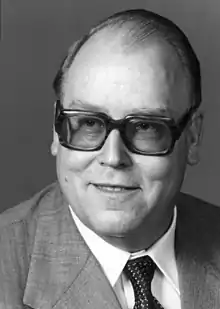Josef Ertl | |
|---|---|
 | |
| Minister of Food and Agriculture | |
| In office 22 October 1969 – 29 March 1983 | |
| Prime Minister | |
| Preceded by | Hermann Höcherl |
| Succeeded by | Ignaz Kiechle |
| Member of the Bundestag | |
| In office 17 October 1961 – 18 February 1987 | |
| Personal details | |
| Born | 7 March 1925 Munich, Weimar Germany |
| Died | 16 November 2000(2000-11-16) (aged 75) Murnau, Germany |
| Political party | Free Democratic Party |
| Alma mater | Technical University Munich |
Josef Ertl (7 March 1925 – 16 November 2000) was a German politician who served as the minister of agriculture in different cabinets of Germany and was a member of the Free Democratic Party (FDP).
Early life and education
Ertl's family were from Bavaria.[1] He was born on 7 March 1925 and raised in Munich.[2][3][4]
Ertl held a bachelor's degree in agriculture from the Technical University Munich in 1952.[2]
Career
Ertl was a member of the FDP to which he joined in the 1950s.[5] He was part of the liberal right wing in the party.[6] He served in the FDP's regional council of Munich from 1952 to 1956.[4] He was the member of the Bundestag from 1961 to 1987.[5] He also headed the Bavarian branch of the party from 1971 to 1983.[7] He was among German politicians who shaped the Europe policy of the country in the 1970s.[8]
He was appointed minister of agriculture to the coalition government led by Prime Minister Willy Brandt on 22 October 1969.[1][9] Ertl replaced Hermann Höcherl in the post.[5] He retained his post until 1983 in various cabinets, but for a short period from 17 September to 1 October 1982 Björn Engholm assumed the post.[9][10]
After leaving office he served as the president of the German agricultural society from early 1984 to late 1990.[7] He was also the president of the German ski association from 1978 to 1991.[4]
Death
Ertl was seriously injured in an accident on the farm of his son in the Upper Bavarian district of Landsberg am Lech in the mid-November 2000.[7] He died of complications resulting from severe burn injuries on 20 November 2000 in Murnau at the age of 75.[11]
References
- 1 2 Michael Balfour (1992). Germany: The Tides of Power. London: Routledge. p. 188. ISBN 978-0-415-06788-1.
- 1 2 "Ex-Landwirtschaftsminister Josef Ertl gestorben". Hamburger Morgenpost (in German). Munich. dpa. 17 November 2000. Retrieved 6 July 2013.
- ↑ "Angehörige des Bundestags / I. -. X. Legislaturperiode" (PDF) (in German). Weltenlauf. 20 October 2005. Archived from the original (PDF) on 7 August 2011. Retrieved 6 July 2013.
- 1 2 3 "Josef Ertl" (in German). F. Neumann Stiftung. Archived from the original on 3 July 2013. Retrieved 6 July 2013.
- 1 2 3 "Josef Ertl" (in German). FDP. Retrieved 6 July 2013.
- ↑ Heinrich August Winkler (2007). Germany: 1933-1990. Vol. 2. Oxford; New York: Oxford University Press. p. 251. ISBN 978-0-19-926598-5.
- 1 2 3 "FDP: Josef Ertl ist tot". Der Spiegel (in German). 17 November 2000. Retrieved 6 July 2013.
- ↑ Jeffrey S. Lantis (1997). Domestic Constraints and the Breakdown of International Agreements. Westport, CT; London: Praeger. p. 40. ISBN 978-0-275-95948-7.
- 1 2 "Die Bundesminister seit 1949" (in German). BMELV. Archived from the original on 19 September 2013. Retrieved 6 July 2013.
- ↑ "The Media Warns of "Dying Forests and Acid Rain"" (PDF). German History in Documents and Images. 9. 1983. Archived from the original (PDF) on 18 December 2007.
- ↑ "Ex-Minister Josef Ertl verstorben". RP Online (in German). 17 November 2000. Retrieved 6 July 2013.
External links
 Media related to Josef Ertl at Wikimedia Commons
Media related to Josef Ertl at Wikimedia Commons
Josef Ertl navigational boxes | |||||||||||||||||||||||||||||||||||||||||||||||||||||||||||||||||||||||||||||||||||||||||||||||||||||||||||||||||||||||||||||||||||||||||||||||||||||||||||||||||||||||||||||||||||||||||||||||||||||||||||||||||||||||||||||||||||||||||||||||||||||||||||||||||||||||||||||||||||||||||||||
|---|---|---|---|---|---|---|---|---|---|---|---|---|---|---|---|---|---|---|---|---|---|---|---|---|---|---|---|---|---|---|---|---|---|---|---|---|---|---|---|---|---|---|---|---|---|---|---|---|---|---|---|---|---|---|---|---|---|---|---|---|---|---|---|---|---|---|---|---|---|---|---|---|---|---|---|---|---|---|---|---|---|---|---|---|---|---|---|---|---|---|---|---|---|---|---|---|---|---|---|---|---|---|---|---|---|---|---|---|---|---|---|---|---|---|---|---|---|---|---|---|---|---|---|---|---|---|---|---|---|---|---|---|---|---|---|---|---|---|---|---|---|---|---|---|---|---|---|---|---|---|---|---|---|---|---|---|---|---|---|---|---|---|---|---|---|---|---|---|---|---|---|---|---|---|---|---|---|---|---|---|---|---|---|---|---|---|---|---|---|---|---|---|---|---|---|---|---|---|---|---|---|---|---|---|---|---|---|---|---|---|---|---|---|---|---|---|---|---|---|---|---|---|---|---|---|---|---|---|---|---|---|---|---|---|---|---|---|---|---|---|---|---|---|---|---|---|---|---|---|---|---|---|---|---|---|---|---|---|---|---|---|---|---|---|---|---|---|---|---|---|---|---|---|---|---|---|---|---|---|---|---|---|---|---|---|
| |||||||||||||||||||||||||||||||||||||||||||||||||||||||||||||||||||||||||||||||||||||||||||||||||||||||||||||||||||||||||||||||||||||||||||||||||||||||||||||||||||||||||||||||||||||||||||||||||||||||||||||||||||||||||||||||||||||||||||||||||||||||||||||||||||||||||||||||||||||||||||||
Authority control databases | |
|---|---|
| International | |
| National | |
| Academics | |
| People | |
| Other | |